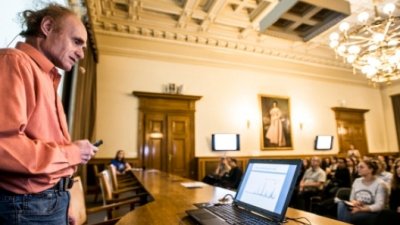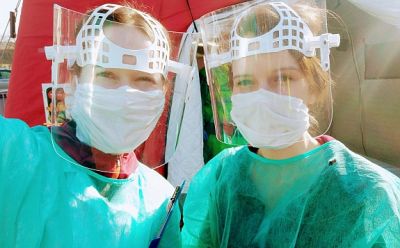The US-based immunologist Václav Větvička says there couldn’t have been more than five people on the plane when he recently traveled back to the Czech Republic. Because of Covid−19. As a scientist, Větvička has been outspoken about what we can – and should – be doing to stay safe. And really do we have any other choice before we get the vaccine?
The Czech Republic went from praise – for how it handled the first wave of the pandemic – to a cautionary tale. I know you are not a virologist but as a scientist you monitor developments: where do you think things went wrong?
I don’t think that the government or decision makers did anything significantly wrong because they didn’t do anything all that different from other countries. We have to remember that when the whole thing started around the world, the situation was different everywhere: Italy, France, Spain were the first and were very hard hit, while here the virus spread later. We were simply lucky that we weren’t among the first and that we were able to shut down everything, everywhere, before the situation got out of control. Because it was the first occurrence, people didn’t complain, either: they wore their masks diligently. Not like now, when you can be on the street and see half the people around you not covering their faces. People were more afraid and the situation stabilized quickly. Were we the best? I think is was pure luck, we were lucky.
Once the situation improved, political pressure grew and the opposition pushed for the countryto reopen, saying the right to travel should no longer be restricted. At the same time, the government wanted people back at work and for industry to recover, so they re-opened. Maybe a little too soon. But that’s easy to say now: nobody really knew. You can look at Israel, which had a very tough lockdown and soon after they reopened, the situation escalated again. Nobody really knew but each tried their best; the only difference is where countries stand now and whether they are better or worse off.
Isn’t it odd, however, that we were so caught off guard by the resurgence of the virus in the fall, since there is an historic precedent? The Spanish flu. It is well documented that the second wave there was much worse.
I don’t really like the terms “first” or “second wave” because the virus is around us and it behaves according to how much room it is given: if we lock down the country and everyone stays home, the virus won’t be able to spread. But that’s not treating the problem. Professionals know from studying the Spanish flu 100 years ago that they took similar measures. Some towns tried lockdowns while others kept everything open. In the United States, I know of two towns where they took opposite approaches and, in the end, there wasn’t a great difference in the number of deaths. The town that locked down slowed the rapidity: instead of a large number of people all dying within two weeks, it took three or four months. It is a matter of spreading out the infection rate so it doesn’t get out of control. That is what we saw with Covid−19 in Italy, where at first they took the situation a little too lightly: I have a friend in the region of Lombardy, which was very hard hit in the beginning, and he told me something I will never forget. He said: “In the beginning we took it as a joke and went to bars, and went singing and to soccer games. Two weeks later we weren’t able to build coffins fast enough.”
We saw many countries go into renewed lockdowns or partial lockdowns last October and November: but there is hope now with the announcement of at least two or three highly effective vaccines. But the distribution itself is not easy or fast, so I suppose the majority of us still have to hang tight and follow measures.
The vaccines really look promising, even when there might be some problems with the one by AstraZeneca. However, even following the fastest possible approval, it will take many months before we can reach substantial numbers of vaccinated people. We have to remember that vaccination will really work when approximately 65 percent of the population will be vaccinated. From the logistical point of view, but also from a manufacturing and manpower point of view, it will still be a nightmare.
Therefore, we need to stick with possibilities we have right now, that means masks, safe distancing, washing our hands. The pandemic is not over and we still need to be very careful.
All that governments have right now is, more or less, to hit the brakes, and shut down, to prevent hospitals from being overrun with Covid patients. We have to be careful and wait until large enough numbers of people can take the vaccine.
We’ve been talking about the pandemic… how important is it to boost immunity at times like this: should we?
Absolutely, yes. The important thing to realise is that we are all different when it comes to our immune system: whether we are older or younger, in shape, under stress, whether we smoke, have a lot of physical activity – those things all influence the level of our immunity. Then there are other factors that are important: if you are fighting a virus, a lot depends on how large a viral dose you were infected with initially. It will never be the same amount. If you get a mild dose, the greater chance there is your immune system will be able to deal with it and you will experience milder symptoms or none at all. But there are things that you can do – you don’t have to be idle.
You have conducted research into what are known as natural immodulators, specifically a substance or extract known as beta glucan. How much do we know about its effects?
Full research started decades ago but real research began in the 1950s and it took until around 1970 or 1975 before we really knew what was going on or might happen. We knew that it supports the immune system but had no idea how. From the 1970s, it was another 30 or 40 years of research; I spent 30 years researching beta glucan and it was a while before we learned which molecule it is, how it binds, which cells and which receptors, which signals are transferred, and so on. We now know the mechanisms, we know the target cells, and we know what beta glucan can do.
Shiitake mushrooms are a source, seaweed…
The major sources are yeast, mushrooms, grains, bacteria, algae where glucan is present in the cell wall. It has a supportive role in the cell structure, similar to the way steel wires are used to reinforce concrete. There are historical aspects behind the types preferred: in western society we are always drinking beer and eating bread, so we have a surplus of yeast; on the eastern side of the world, in Japan, China and Russia, they consider mushrooms a folk remedy. Here, we eat mushrooms for the taste but there they eat them for health. We are more inclined towards yeast glucans. Humankind has of course relied on using natural molecules for 6‚000 years, something confirmed on tablets from Sumer, whether we are talking about plants or plant extracts.
While we may consume a lot of yeast, you actually can’t get the benefits of beta glucan just by eating it, can you? It has to be extracted and therefore taken as a supplement.
Yes. If you just eat or drink beer you won’t get the benefits: otherwise the Czechs would be among the healthiest of nations because we eat so many mushrooms and also drink a certain amount of unfiltered beer! When it comes to extraction, it has to be properly isolated and pure, and isolating glucan from the cell wall is not an easy process. In a labor or in the factory that means boiling it in sodium hydroxide at a temperature of 80 degrees Celsius. It’s a relatively complex and tough process and purification comes after. If you just boil it in ordinary water, the glucan remains in the cell wall and our gastrointestinal system simply cannot absorb it from food during the short period it is in our system. Eating it won’t work. It’s important, also to point out, that pregnant women, or people who have had a transplant, should not use it.
Where has your research uncovered promising results?
I think where the research is the furthest when it comes to final results is in cancer: there is always lots of money for cancer research. Beta glucan also got a boost because several types of glucan were officially approved as a drug in Japan and have been used in cancer treatment there since 1983. Almost 40 years. So we are behind. They recognised that it works and chose to use it first and learn all the details of how it works later.
Western medicine is the opposite: we won’t use it until we uncover every last thing about it. We’ve helped: we and others found and proved that when beta glucan is used together with anti-tumour molecular antibodies, it is more effective than using either antibodies or glucan on their own. You can significantly improve their effectiveness by using them together. There are around 50 or 60 clinical trials worldwide – in the US, Europe, Asia – where they are hoping to confirm similar results, whether it relates to GI tumours, breast tumours, lung tumours, and I am pretty confident it will be approved for use in cancer treatment in the west during my lifetime.
The pandemic has upended everything and forced us to adapt, in school that means distance learning. You studied at CU’s Faculty of Science in 1970s Czechoslovakia, when conditions were very different and the country was under communist rule. How do you look back on your time at Charles University?
It was a very different period, not long after the Soviet-led invasion and that meant half of the professors were gone and there was a gap and we lacked their materials. With a few political exceptions, professors who remained tried very hard to help us. I saw it as a very positive thing. They taught us that doing science would be highly rewarding but also warned that there would be times when we spent months on something that would not work out. Despite such ups-and-downs, they taught us not to cry at home over a few lost months but to move on. That is something only a good teacher will tell you.
| Professor Václav Větvička |
|
Václav Větvička teaches at the School of Medicine, Department of Pathology, at the University of Louisville, Kentucky in the United States. He graduated from Charles University in 1978 and received his Ph. D. in 1983 from the Czechoslovak Academy of Sciences, Institute of Microbiology. He is the author of several monographs and a member of the Czech Immunological Society and American Association of Immunologists. He specialises in research of the immunomodulator beta glucan. |




















